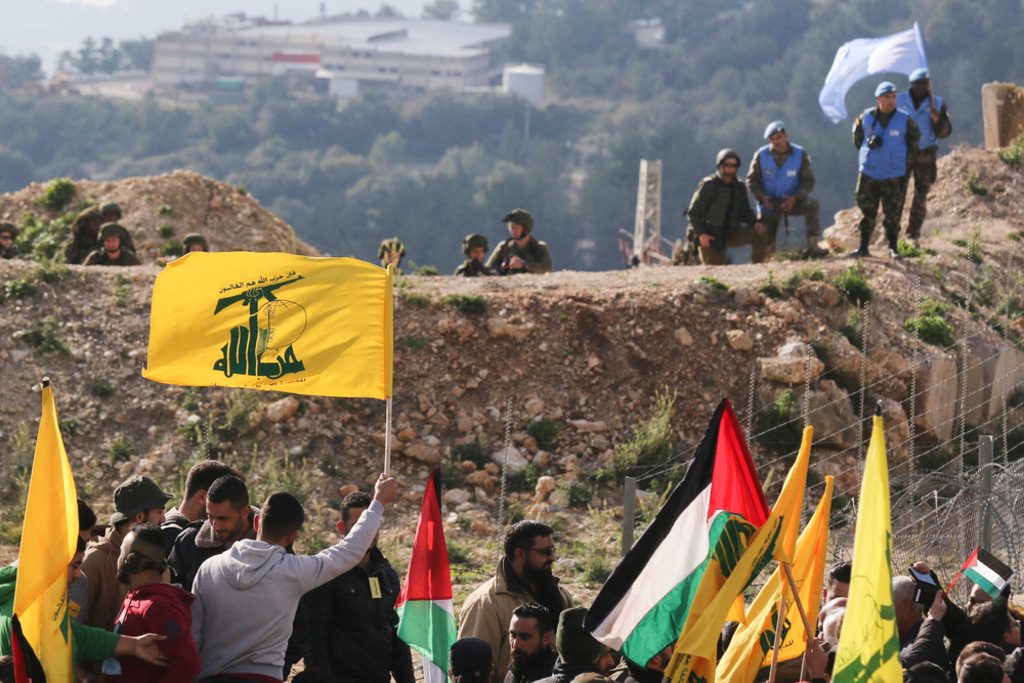
Despite continual warnings that the next war between Israel and Hezbollah is on the horizon, the deterrence policy between the two has so far maintained peace, even as the Lebanese militia’s involvement in Syria has made the détente more fragile.
A more hawkish American stance on Iran as President Donald Trump reshuffles his national security and foreign policy team and tensions over Lebanon’s plans to explore for gas and oil in waters disputed by Israel could also foreshadow a greater likelihood of an Israel/Hezbollah conflict.
Yet despite tough talk on both sides, it still does not appear that either is eager to rush back into a potentially devastating conflict just yet.
Lebanon paid a high price for the 2006 war, even though Hezbollah claimed victory after Israeli forces withdrew. The vast majority of people killed were Lebanese – about 1,100, according to Human Rights Watch, most of them civilians – while 43 Israeli civilians and 12 Israeli army soldiers died. Lebanon’s infrastructure also sustained major damage.
Although no peace agreement followed that conflict, an uneasy truce has prevailed. Lebanese scholar Jean-Loup Samaan, writing about the unofficial deterrence policy for the United States Army War College, noted, ‘Because both sides understood that a next round would be devastating and that each could not entirely eliminate the threat of retaliation in a first wave, the solution has been to bargain deterrence, meaning to deter the other party from attacking its homeland by pledging a full-scale retaliation.’
But Samaan added that maintaining that delicate balance is hardly assured: ‘To say that stability has been preserved between Israel and Hezbollah thanks to deterrence does not mean that this is a perennial state.’
The prevailing wisdom is that another conflict will be more damaging to both sides. Hezbollah has acquired more advanced weapons and its fighters have gained combat experience fighting in Syria. Meanwhile, Israel has signalled that it would regard all Lebanese infrastructure as a legitimate target in the next war – as, indeed, it also targeted civilian infrastructure in the last round of fighting.
Israeli officials have also sounded alarms about Hezbollah’s alleged plans to produce precision weapons at a factory that Iran is building in Lebanon. The Israelis have gone on a media offensive, with an Israeli army spokesman taking the unusual step of publishing an article in Arab-language media warning about the dangers of such a factory.
Israel has threatened to bomb the plant but has so far not done so, instead limiting itself to trying to prevent weapons shipments reaching Hezbollah via Syria by bombing arms convoys and weapons manufacturing facilities inside Syria.
International Crisis Group, in a recent report on the potential escalation of tensions between Israel and Iran/Hezbollah in Syria, noted that all parties have operated on a principle of ‘what happens in Syria, stays in Syria’, with Israel limiting its strikes on Hezbollah convoys to Syrian – not Lebanese – territory. For its part, the Syrian military has generally refrained from firing on the Israeli planes that have carried out these strikes.
The Israeli newspaper Haaretz wrote in a January 2018 article that an attack on facilities in Lebanon would be a ‘last resort’ for the Israeli army, which is prioritizing ‘clandestine activities, the exposure of the sites and a diplomatic effort to stop production at the plants’.
Some Arab and Israeli media outlets reported in late March 2018 that Israeli jets had attacked Hezbollah targets in eastern Lebanon near the Syrian border. Israeli officials did not confirm this and Hezbollah denied that the attack took place, suggesting that whether or not it did, the group is not willing to go to war in response.
There has been plenty of tough talk on both sides over the past year, with Hezbollah leader Hassan Nasrallah vowing that in the next conflict “there will be no place that is out of reach of the rockets of the resistance or the boots of the resistance fighters”.
On the Israeli side, former Defence Minister Moshe Yaalon said that in the next war every Lebanese
will suffer from the next war because all infrastructure will be destroyed”.Meanwhile, there has been a spate of news reports quoting unnamed Hezbollah sources as saying that the group is preparing for the next war with Israel. However, the veracity of these reports has been questioned or disputed.
Hezbollah’s deputy leader, Sheikh Naim Qassem, told Reuters that he does not anticipate that war is imminent. Hezbollah “is ready to confront the aggression if it happens, if Israel decides to carry out any foolish action”, Qassem told the news outlet. “But it does not appear that the circumstances are for an Israeli decision for war.”
However, there are several factors adding an element of uncertainty to this statement, including the unknown direction of events in Syria, the Lebanese gas and oil exploration, tensions around Israel’s construction of a border wall on disputed territory, the increasingly open anti-Iran alliance between Israel and Saudi Arabia and the outcome of Lebanon’s parliamentary elections on 6 May 2018.
The other wild card is the unpredictable direction of American foreign policy in the Middle East. Trump has fired some relatively moderate figures in his administration, including former Secretary of State Rex Tillerson and National Security Adviser Herbert Raymond McMaster. They have been replaced by two figures considered much more hawkish and supportive of Israel: former CIA Director Mike Pompeo and former US Ambassador to the United Nations John Bolton.
Right-wing figures in Israel have celebrated the appointments while Lebanese media have reported that there are concerns that the presence of more vehemently anti-Iran leadership in the White House ‘may give Israel political cover for any military operation it intends to implement’.
However, it is still too early to say what the impact of the appointments will be on the US’ stance towards Iran and how that might impact affairs in Lebanon. In the meantime, the deterrence policy appears to be preserving the peace – at least for now.


